Practice Happiness

I’ve been diving a lot into the science of happiness and contentment for the past months as I prepare for our second child. These are some things I’ve found useful.
1. Meditation
I’ve been practicing meditation for about 5 years. I don’t have a consistent practice, it comes and goes. Even so, meditation has helped me be more patient with my son Teo, my wife Malin and with all the struggles of parenting. Meditation has improved how I treat myself and other humans, cultivating empathy, reflection and improving my self-awareness.
A great boon of meditation is that it creates space between action and reaction, between something happening around me, or to me and me reacting to it. That space is great to make better decisions on how to react to things and to learn to know myself.

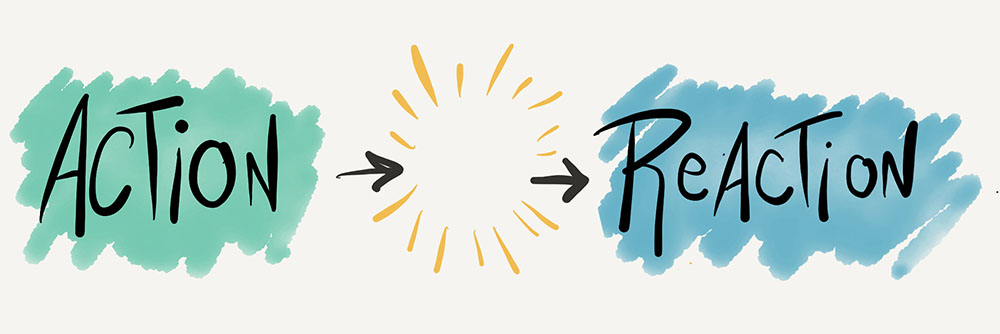
Meditation creates space between action and reaction.
As my son throws a tantrum for the 4th time this morning, I can see my anger and irritation rise within me and choose to be patient, because I know that patience and being calm are far better tools to take care of a 3 year old than anger and shouting. Without meditation, I’m far more likely to have my anger bubble out making everything worse.
Likewise meditation makes me aware of feelings and thoughts as I experience the world. As I feel anger, irritation or discomfort about a person or situation at work, I can take a mental note, understand the source of those thoughts and feelings, and prevent them from taking the better of me. Sometimes, I’ll find that the mere act of taking a mental note of a feeling “I’m angry” has the power to dispel that very feeling (which is nuts, but it works).
Headspace is a great place to start meditating. It’s beautiful and extremely beginner friendly.
Mindfulness, a practical guide to finding peace in a frantric world was the book that got me into meditation in 2015. That’s a nice way to get into meditation if you enjoy reading books.
2. Exercise
Super basic, but there’s no bad mood that going for a walk can’t fix.
Low on morale => exercise
Low on energy => exerciseCan’t find energy to exercise? Start with 5 minutes. Anyone can do 5 minutes of anything.
Can’t do 5 minutes? Do 1 minute.
is go exercise too vague of an advice? Do this:
- If you aren’t much for sports or exercise, start by taking brisk walks. Any length works. You’ll find yourself taking longer walks than you expected because they’re enjoyable. You can be present and enjoy nature, or talk to a friend, or listen to an audiobook, podcast or music.
- The next step is doing HIIT or High Intensity Interval Training. This is good for you heart, your metabolism and your brain. Anything that rises your heartbeat is good for you. Don’t know where to start? Try Freeletics. They have lots of free workouts that you can do without any equipment. If you haven’t done much exercise before, take it easy at first.
- Then combine it with strength training by lifting weights and incrementally increasing the weight over time as you get more fit. Strength training increases your strength, develops muscles, increases bone density, flexibility and combats aging. Bigger, leaner, stronger is a great book to get started with strength training.
Adults who engage in leisure time aerobic and muscle strengthening activities show greatly reduced risk of all cause and cause specific mortality.
[Recommended physical activity and all cause and cause specific mortality in US adults: prospective cohort study
](https://www.bmj.com/content/370/bmj.m2031)
At the end of the day, if you can find a form of exercise that you enjoy, rises your heartbeat and you can do consistently you’re doing great.
3. Journaling
Journaling, the habit of writing down your daily experiences and thoughts, helps me develop more self-awareness, and creates a space and time for me to talk to myself. It’s a very peaceful and enjoyable activity.
Journaling is something that had been repeatedly recommended to me but I never got around to doing. Oddly enough, the breakthrough for me was reading Jordan Mechner’s own journal on The Making of Prince of Persia. By reading his words, his thoughts about graduating from university and coming of age, his hopes for the future, his struggles when choosing between a career in game development and film making, his writing about trivial daily things… it finally clicked. And so I started journaling and it’s been a wonderful experience. You should try it too. And if you’re lacking inspiration. Try reading The Making of Prince of Persia.
Tip: Get a real good notebook and a real good pen. It gives you that additional visceral joy in the mere act of putting pen to paper. Baronfig are the ones I use, and they are awesome.
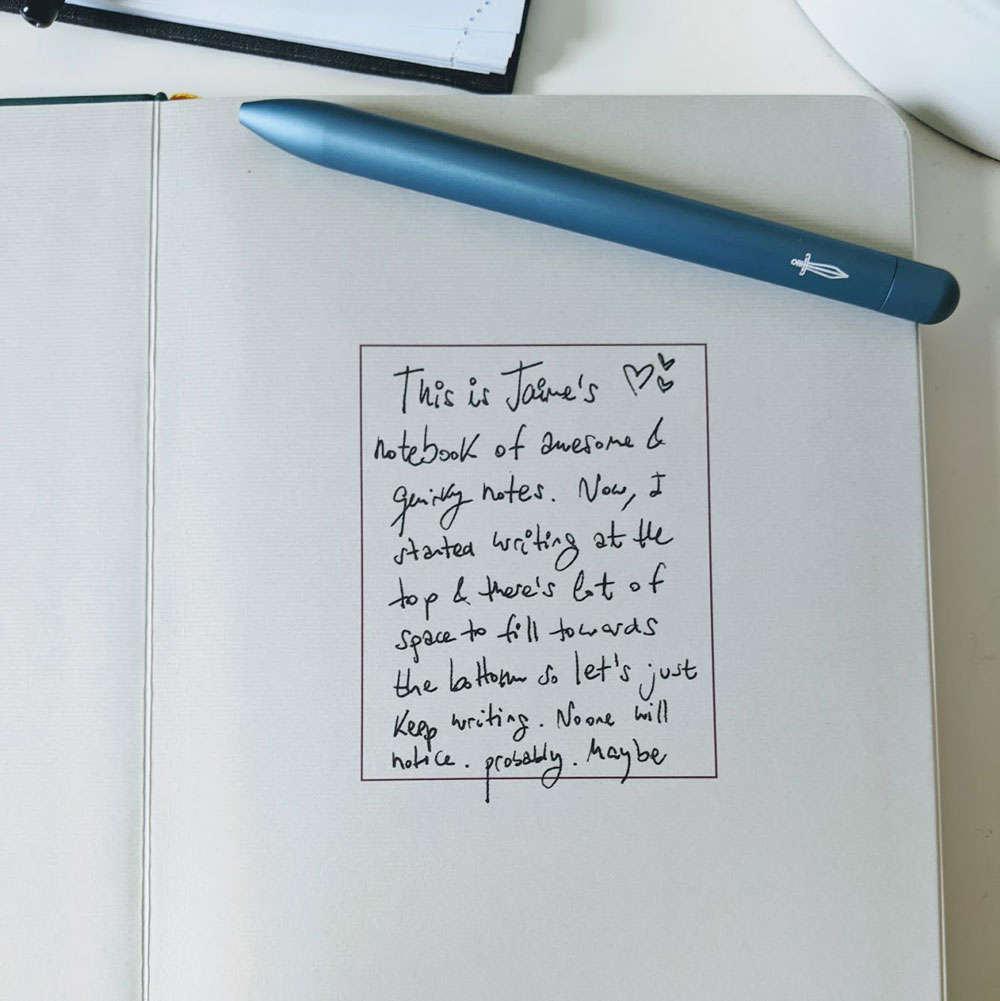
4. Gratitude
I combine gratitude with my journaling. It helps me focus in the things that I appreciate in life and to cultivate appreciation.
No matter how shitty my day has been, there is at least one thing I’m sure to be grateful about. (plot twist: There’s more than one. The more you cultivate appreciation the easier it is to find the good in life.)
If you don’t know where to start, just write down one thing you are grateful for every night before going to bed. If you already have a habit of journaling, or taking notes while planning your day, a great way to start a habit of gratitude is to take that time to write what you are grateful for. (This technique is known as habit stacking and is a great way to take advantage of existing habits to develop new ones).
The little book of Gratitude is a short and super cute book that you can use to cultivate more gratitude.
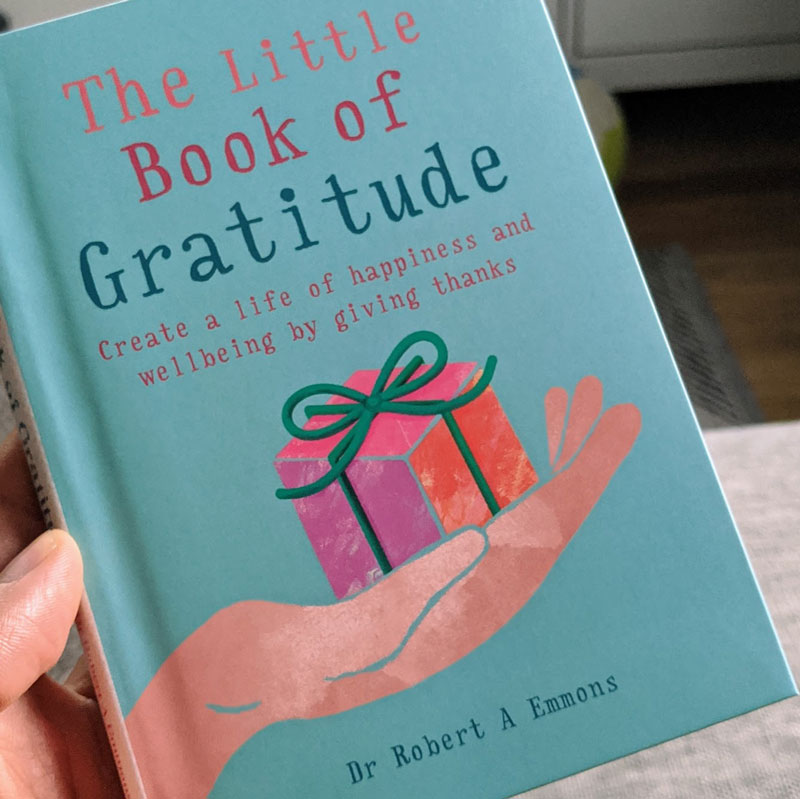
5. Investing in your strengths
This was something I learned in The Science of Well-being. A course about increasing your happiness that Laurie (from The Happiness Lab) does at Yale. The tl;dr is that you are happier if you spend time doing things that you enjoy doing, that play to your character strengths 😅 (doh)
In the hecticness of life it is easy to come out of contact with this basic principle. We very easily fall into the daily grind, and start focusing more in what it is expected of us and what others need from us that we get out of touch with our own needs.
Do you know what makes you happy? Can you carve some time for it in your day to day?
If you aren’t fully aware of your character strengths or you have never stopped to think about it, there’s a free survey that is a great way to get some ideas.
These are mine:
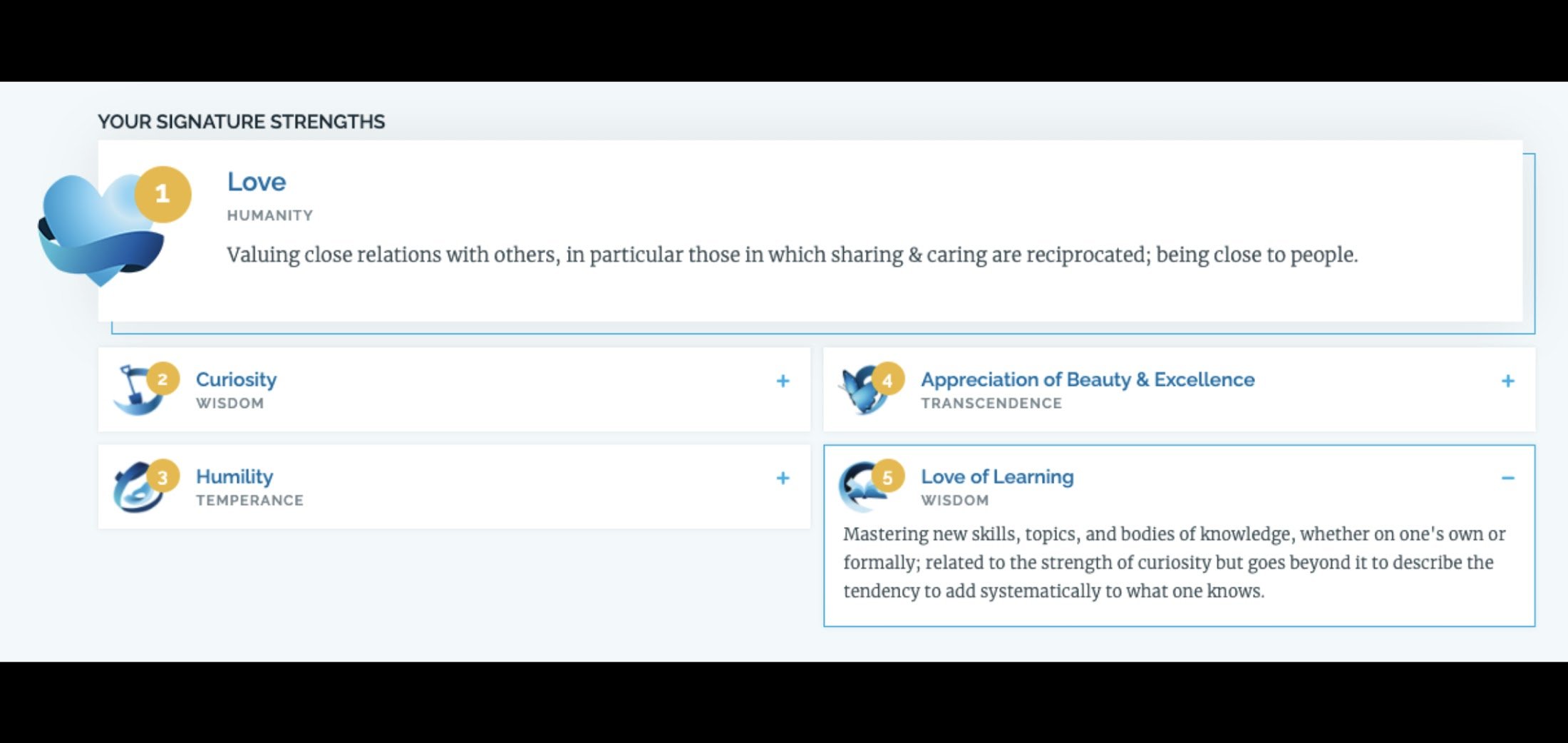
I’ve learned that if I spend some of my day doing any of those things I feel happier and more content. Even doing one thing, for as short as 30 minutes counts. For example, I’m super curious and love learning new stuff. If I block 30 minutes or less to learn something new, I feel a profound sense of contentment that accompanies me for the rest of the day.
6. Sleep
Sleep should probably be at the top of this list. It is the one thing whose lack of makes the most difference in your energy and mood levels. Yet it is so easy to trade hours of sleep for anything else. You may trade hours for getting ahead in your career, or to play video games and watch series. There’s also something called revenge bedtime procrastination, a phenomenon in which people who don’t feel in control over their daytime life refuse to go to sleep so that they can regain a sense of freedom and control during late night hours. This is me as a parent. Night time is pretty much the only time of the day where I feel I can get some me-time. And I bet that there are a lot of people out there in the same situation as me.
The problem is that continuously trading sleep at night for doing other things is an evil circle where you progressively become more tired, more irritable, until you get to a point where you are so exhausted that you can’t enjoy life. You aren’t even present. You are a husk. And that’s no way to live. Therefore get some sleep.
It is very easy to go around tired or even exhausted and not realize you aren’t sleeping enough. Devices like smart watches or a fitbit are great tools to help you realize how little you sleep and/or exercise. They put a number on it, they bring it to your attention and they nudge you ever so slightly towards doing something about it.
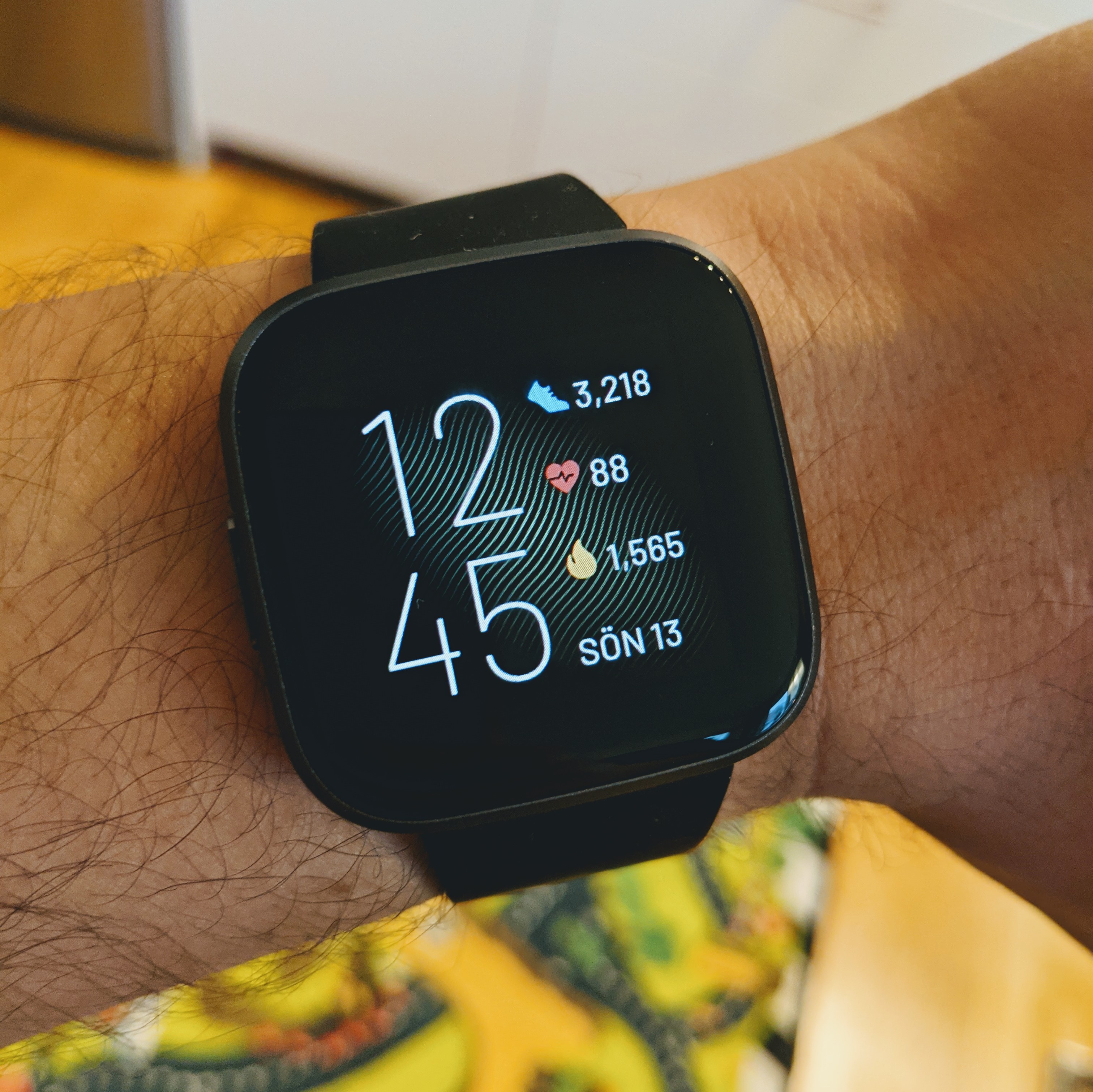
A great book to learn more about the importance of sleep is Why we Sleep: Unlocking the Power of sleep and dreams.
Where can I Learn More?
So that’s it! Hope you can use any of these tricks to have a more fulfilling and content life!
Here’s a couple of places that you can use to continue your journey:
- The Happiness Lab. A really great podcast about the science of happiness that you can start listening to in your next brisk walk. Do it. Right now! :)
- The Science of Well-being is a free course that teaches you a lots of the theory behind the science of well-being (how bad we are at predicting the things that will make us happy, what things do really make us happy, etc…) and a bunch of practices like the ones detailed above to help you live a happier life.
Have a wonderful day!
This article started as a twitter thread, if you find it useful and want more, find me on twitter.

Written by Jaime González García , dad, husband, software engineer, ux designer, amateur pixel artist, tinkerer and master of the arcane arts. You can also find him on Twitter jabbering about random stuff.
